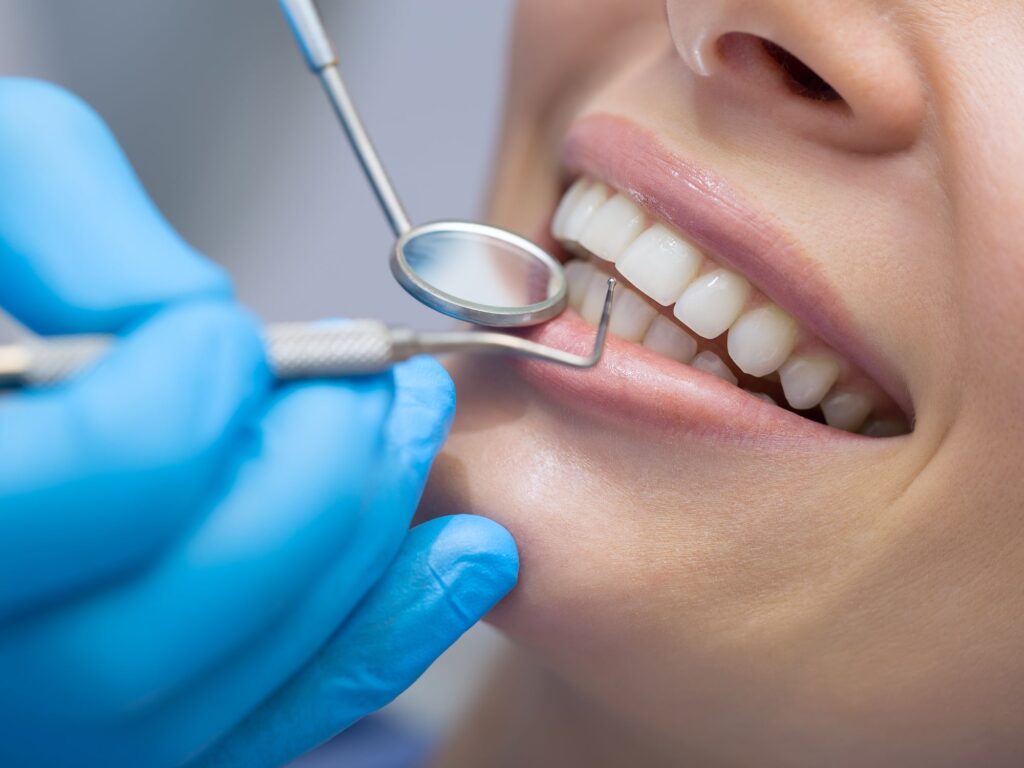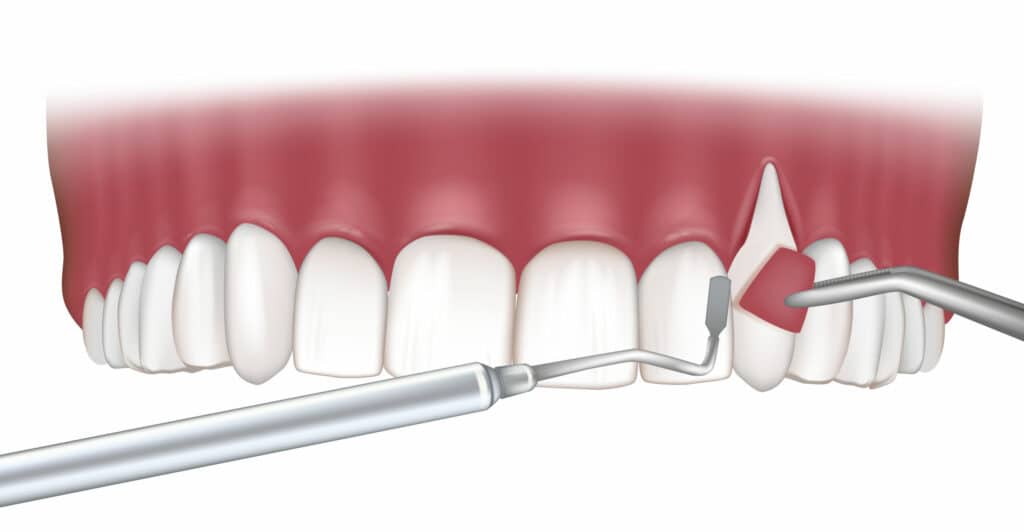Oral Health is very important and maintaining it is a matter of great concern as nowadays oral health is getting easily deteriorated . One such concern that often arises is receding gums. Receding gums can be caused by genetics, poor dental hygiene, gum disease, hormonal changes, or even brushing too hard. Regardless of the cause, the result can be uncomfortable and unsightly. Once a person has acquired this disease then his world revolves around only one question: do Receding Gums Grow Back?
Fortunately, there are ways to treat and prevent receding gums from worsening. This article will explore what causes receding gums and how you can grow them back naturally without resorting to expensive surgeries or treatments. Whether you have experienced some degree of gum recession or want to take preventative measures for future oral health issues, this information will prove invaluable in your journey toward optimal dental well-being.

Understanding The Causes Of Gum Recession
Gum recession is a common condition that affects millions of people worldwide. It occurs when the gum tissue surrounding the teeth wears away, exposing more of the tooth’s root. Gum recession can be caused by various factors such as aggressive brushing, periodontal disease, genetics, hormonal changes, and smoking.
Preventive measures are crucial in reducing the risk of gum recession. Maintaining good oral hygiene practices such as regular brushing and flossing can help prevent plaque buildup, one of the leading causes of gum disease. Additionally, avoiding tobacco use and limiting alcohol consumption can lower your chances of developing this condition.
Lifestyle changes may also play a significant role in preventing gum recession, especially for those concerned about gum recession at 20. A balanced diet rich in vitamins and minerals can improve oral health, reducing inflammation and promoting healthy gums. Regular exercise has been shown to reduce stress levels, which can contribute to poor dental habits like teeth grinding or clenching. Adopting these preventive measures and lifestyle changes early on can significantly decrease your chances of experiencing gum recession later in life.

Recognizing The Signs And Symptoms
As a periodontist, it is essential to recognize the signs and symptoms of gum recession. Some common indicators include tooth sensitivity or elongation, bleeding gums during brushing or flossing, bad breath, loose teeth, and receding gum lines. If you notice any of these symptoms, scheduling an appointment with your dentist immediately is crucial.
Regular dental checkups are critical for detecting gum recession early on since many people don’t even realize they have this condition until it has progressed significantly. Dentists can examine your gums for inflammation during routine checkups and measure the depth around each tooth. They can also evaluate whether any pockets between the teeth indicate gum disease.
Preventing gum recession starts with good oral hygiene practices such as regular brushing and flossing after meals. Additionally, avoiding tobacco products, maintaining a healthy diet rich in vitamins C and D, and reducing stress levels can all prevent gum recession. It’s important to note that if you develop gingivitis (an early stage of gum disease), treating it promptly will prevent further damage to your gums and reduce the risk of developing more severe conditions like periodontitis.

Seeking Professional Help To Help Your Receding Gums Grow Back
If you have noticed your gums receding, it is important to seek professional help as soon as possible. While you can take measures at home to improve gum health, such as proper brushing and flossing techniques and mouthwash, these may not be enough to reverse or prevent further recession. In this section, we will discuss finding a specialist who can provide effective treatment options based on your needs.
Finding specialists specializing in receding gums is crucial for receiving quality care. Periodontists are dental professionals with specialized training and expertise in preventing, diagnosing, and treating conditions that affect the supporting structures of teeth, including gums. They work closely with dentists and other medical professionals to develop comprehensive plans tailored to each patient’s situation. To locate a qualified periodontist in your area, consider asking your dentist for a referral or searching online directories.
👉 Learn more about effective gum regrowth treatment options that can restore your smile naturally
The cost of treatment is often a concern when seeking professional help for receding gums. The cost varies depending on the severity of the condition and the type of treatment the specialist recommends. Some common treatments include deep cleaning (scaling and root planning), gum graft surgery, pocket reduction surgery, regenerative procedures like platelet-rich plasma therapy or guided tissue regeneration, or orthodontic intervention like braces or aligners. Your insurance coverage may also play a role in determining costs. Consult with your specialist about any financial concerns before proceeding with treatment.
Seeking professional help from a qualified specialist can make all the difference in restoring gum health and preventing further damage. By finding an experienced periodontist familiar with Receding Gums Grow Back Naturally and discussing any potential costs upfront, patients can feel confident they are taking steps towards better oral health. Remember that early detection and action can lead to more successful outcomes – schedule an appointment today!

Fastest Way to Heal Gums
When it comes to the fastest way to heal gums, it’s essential to prioritize consistent oral hygiene practices. Regular brushing, flossing, and rinsing with an antibacterial mouthwash are foundational. Incorporating a soft-bristled toothbrush and gentle brushing motions can prevent further irritation. Additionally, consider integrating natural remedies like aloe vera or saline rinses, known for their soothing properties and potential to promote gum healing.
However, for persistent issues or significant gum recession, seeking guidance from a dental professional remains crucial for tailored solutions and faster recovery. Balancing home care with professional advice ensures a comprehensive approach toward healing gums swiftly and effectively.
Implementing Good Oral Hygiene Habits
Good oral hygiene habits are critical to maintaining healthy teeth and gums. Proper brushing techniques and flossing tips can help prevent gum recession and other dental problems. Regular visits to the dentist for professional cleanings and checkups also play a crucial role in preventing gum disease.
When brushing your teeth, it is important to use the correct technique. Brush at least twice a day using circular motions on all surfaces of each tooth. Be sure not to forget the back molars or any hard-to-reach areas. Additionally, consider using an electric toothbrush with soft bristles for better results.
Flossing should be done daily to remove plaque between teeth that cannot be reached by brushing alone. Gently slide the floss up and down against each tooth, careful not to force it into the gums. Water flossers may be a suitable alternative for those who struggle with traditional flossing methods. Consistency is key to good oral hygiene practices, so keep up with these habits!

Making Dietary Changes For Improved Dental Health
Maintaining healthy teeth and gums requires more than just brushing and flossing. Dietary modifications can significantly improve dental health, as certain nutrients are essential for strong teeth and healthy gums. Nutritional supplements may also be beneficial in filling any gaps in a person’s diet.
One of the most important dietary changes is limiting sugary foods and drinks. Sugar promotes bacterial growth that can lead to tooth decay and gum disease. Instead, opt for foods rich in calcium, vitamin D, phosphorus, and magnesium, which help strengthen tooth enamel. Leafy greens like spinach and kale are excellent sources of these nutrients.
Another key nutrient for dental health is vitamin C. This powerful antioxidant helps prevent inflammation and supports collagen production, crucial for maintaining healthy gums. Foods high in vitamin C include citrus fruits, berries, kiwi, bell peppers, broccoli, and tomatoes. Nutritional supplements may offer additional support for individuals who struggle to consume enough of these foods through their regular diet.
Incorporating these dietary modifications into your daily routine can greatly enhance oral health. By reducing sugar intake while increasing consumption of nutrient-rich foods like leafy greens and vitamin C-rich produce, you’ll provide your body with the building blocks needed to maintain strong teeth and gums. Additionally, speaking with a healthcare provider or dentist about incorporating nutritional supplements into your daily regimen can ensure you get all the necessary vitamins and minerals for optimal dental health without overdoing it on any particular nutrient.

Using Natural Remedies To Promote Gum Growth
It can be disheartening to see your gums start to recede. Not only does it make your teeth appear longer, but it also exposes the roots of your teeth and makes them more susceptible to decay. Fortunately, natural remedies can help promote gum growth and prevent further recession.
One effective way to stimulate gum tissue is through gum massage. This involves gently rubbing your gums with a clean finger or soft-bristled toothbrush in circular motions for a few minutes each day. Gum massage increases blood flow to the area, which helps nourish the tissues and encourage new growth.
Another option is using herbal remedies known for their ability to promote healthy gums. Some popular herbs include sage, chamomile, peppermint, and clove. These herbs have anti-inflammatory properties that can reduce swelling and irritation in the gums while promoting healing. You can use these herbs by brewing them into teas or making mouthwashes with essential oils extracted from them.
Natural remedies such as gum massage and herbal remedies offer a safe and affordable way to promote gum growth without resorting to invasive procedures. Incorporating these practices into your oral care routine may improve your gums’ health and enhance your overall well-being.
- Sage, chamomile, peppermint, and clove are all effective herbal remedies for promoting healthy gums.
- Gum massage stimulates blood flow to the gum tissue, encouraging new growth.
- You can safely and affordably promote gum growth without invasive procedures by incorporating natural remedies into your daily oral care routine.

Surgical Options for Receding Gums
When non-surgical treatments fail to address the issue, it may be necessary to consider surgical options. Surgical techniques are aimed at restoring gum tissue and preventing further recession. Gum grafting is one of the most common surgical procedures performed by periodontists.
Gum grafting involves taking healthy gum tissue from another part of your mouth or using donor tissue to cover exposed roots. This procedure can help reduce sensitivity and improve the appearance of your smile. However, there are also alternatives to gum grafting that may be suitable depending on individual needs and circumstances.
Gum Grafting Alternatives
| Procedure | Description |
|---|---|
| Pinhole Surgical Technique (PST) | A minimally invasive technique that uses a small hole in the gums to loosen and reposition existing gum tissue over receded areas. |
| Alloderm | Human donor connective tissue is used instead of harvesting from the patient’s body. Does not require second-site surgery for harvest like traditional grafts do. |
| Guided Tissue Regeneration (GTR) | Uses a barrier membrane placed between the tooth surface and gum tissue to promote new bone growth, which encourages the regrowth of lost gingival tissues |

Maintaining Oral Health For Long-Term Success
Considering surgical options is an important decision when managing Receding Gums Grow Back. However, maintaining oral health for long-term success should also be a top priority. Preventing the recurrence of gum recession can be achieved through proper oral hygiene practices and regular dental checkups.
To prevent gum recession, it is crucial to maintain good oral hygiene habits such as brushing twice daily with fluoride toothpaste, flossing at least once a day, and using an antiseptic mouthwash regularly. These steps help remove plaque buildup, which can cause inflammation in the gums leading to further gum problems, including recession. Avoiding tobacco products and limiting sugary drinks and snacks is also advisable since they promote bacterial growth that harms teeth and gums.
Regular dental checkups are necessary for monitoring the progress of gum health and preventing possible complications. During these visits, your dentist will perform deep cleanings, scaling, and root planing if needed, removing any tartar buildup below the gum line that may contribute to recession. With early detection, your dentist can recommend preventive measures before more severe damage occurs, making preventive care vital for maintaining healthy gums over time.

Frequently Asked Questions
Is It Possible For Receding Gums To Grow Back Completely?
Periodontal disease is a common condition that affects millions of people worldwide. The symptoms of this disease include bleeding gums, bad breath, and receding gum lines. While various natural remedies are available to manage the symptoms of periodontal disease, they may not be effective in reversing the damage caused by Heal Receding Gums. Surgical options such as gum grafts or pocket reduction surgery can repair damaged gum tissue and help prevent further disease progression. As a periodontist, educating patients on natural remedies and surgical options is important to ensure optimal oral health outcomes.
How Long Does It Typically Take For Gums To Grow Back After Implementing Good Oral Hygiene Habits?
Maintaining good oral hygiene habits prevents gum recession and promotes healthy gums. Oral health tips such as brushing twice daily, flossing daily, using mouthwash, and visiting the dentist regularly can help prevent further gum recession and promote overall health. In addition to these tips, natural remedies such as oil pulling with coconut or sesame oil, massaging the gums with aloe vera gel, and consuming vitamin C-rich foods may also improve gingival health. However, it’s important to note that the time frame for gums to grow back after implementing these habits varies depending on individual cases and the severity of the condition. As a periodontist, I highly recommend incorporating these tips into your daily routine to maintain healthy gums and prevent future dental issues.
Can Gum Recession Be Reversed Without Surgery?
Periodontal disease is a common condition that can result in gum recession. While traditional dental procedures such as flap surgery and grafting can effectively reverse this issue, many patients seek natural remedies to avoid invasive surgical interventions. Unfortunately, there is limited scientific evidence supporting the efficacy of these methods, and they should not be used as a substitute for professional treatment. Individuals experiencing gum recession need to consult a periodontist who can provide personalized recommendations for their case. With proper care and attention, it may be possible to slow or stop the progression of gum recession and prevent further damage to oral health.
Can Receding Gums Be Caused By Genetics?
Genetic predisposition and lifestyle factors can play a significant role in the development of gum recession. Studies have shown that individuals with a family history of periodontal disease are more likely to experience Receding Gums Grow Back. Smoking, poor oral hygiene habits, and stress have also been linked to an increased risk of gum recession. While genetics cannot be changed, adopting healthy lifestyle behaviors such as proper brushing and flossing techniques, avoiding tobacco use, and managing stress levels can help prevent or slow down the progression of gum recession. As a periodontist, educating patients on their individual risk factors and providing tailored treatment plans to address any existing issues is important.
Are There Any Medications That Can Cause Gum Recession?
Certain medications can hurt gum health and potentially cause gum recession. These medications include immunosuppressants, calcium channel blockers, and anti-seizure drugs. In addition to medication side effects, poor oral hygiene practices such as infrequent brushing or flossing can also contribute to gum disease and recession. It is important for patients taking these types of medications to maintain good oral hygiene habits and regularly visit their dentist or periodontist for checkups and cleanings. By staying proactive in their dental care, patients may be able to prevent or minimize the extent of any potential gum recession caused by medication use.
Conclusion
Receding gums, also known as gingival recession, can be a common dental issue that affects many individuals. While receding gums can grow back completely, the degree of regeneration and growth may vary depending on the severity of the condition. The success rate of gum tissue regrowth depends largely on implementing good oral hygiene habits such as regular flossing, brushing with fluoride toothpaste, and using an antiseptic mouthwash.
In some cases, gum recession can be reversed without surgical intervention through non-invasive measures such as scaling and root planing or topical agents. However, severe cases of gum recession may require surgery such as grafts or flap surgeries to restore healthy gum tissue. It is essential to address any signs of receding gums early on to prevent further damage from occurring.
Everybody should understand the importance of maintaining good oral health practices in preventing and treating receding gums. Genetics can play a role in causing gum recession; however, lifestyle factors such as smoking and poor oral hygiene habits are often contributing factors. Certain medications, such as blood pressure drugs, may cause gum inflammation leading to gum recession. Therefore, it’s crucial always to inform your dentist about any medication you’re taking so they can monitor any potential side effects closely.
While there is no guarantee that receding gums grow back entirely, practicing excellent oral hygiene combined with appropriate treatment plans can help slow down or even reverse its progress. Regular dentist visits are necessary to promptly identify signs of gingival recession and develop effective treatment options tailored to your needs.


 by
by 

